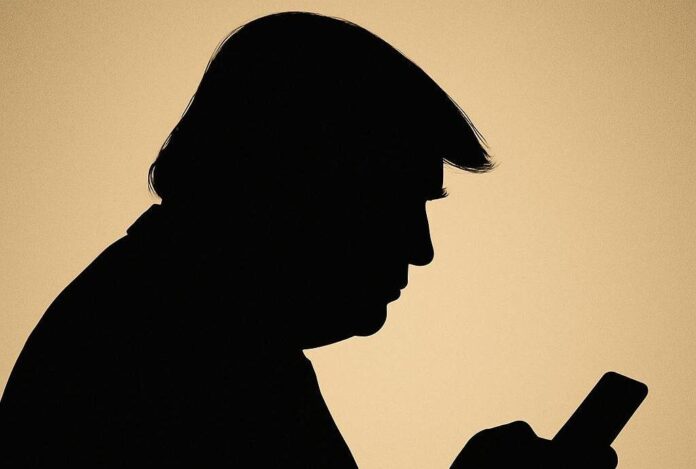President Donald Trump has publicly demanded that NBC fire late-night host Seth Meyers “IMMEDIATELY” following a series of comedic segments targeting the president. The call for termination, posted on Truth Social on Saturday, November 15, marks the latest escalation in tensions between the Trump administration and late-night television personalities.
Trump’s post accused Meyers of suffering from “an incurable case of Trump Derangement Syndrome,” claiming the host appeared in “an uncontrollable rage” during his show. The president further criticized NBC’s Seth Meyers as a “Ratings DISASTER” and declared that “Meyers has no talent, and NBC should fire him, IMMEDIATELY!”
The remarks follow multiple monologues in which Meyers made jokes at the president’s expense over the past week. The late-night host has targeted several Trump-related topics, including government shutdown negotiations, proposed healthcare plans, a controversial 50-year mortgage proposal, and a private dinner with finance executives. Meyers also addressed the ongoing controversy surrounding files related to disgraced financier Jeffrey Epstein.
The controversy comes amid heightened scrutiny over the Epstein case. This week, Democrats on the House Oversight Committee released emails referencing Trump that were sent by Epstein. Trump has repeatedly denied any knowledge of Epstein’s crimes and stated he ended their relationship years ago.
The bill to release documents related to Jeffrey Epstein was passed in the House by a vote of 427-1 and in the Senate by unanimous consent. Trump signed the bill on November 19, 2025, directing the U.S. Department of Justice to release the files within 30 days.
White House press secretary Karoline Leavitt responded to the email revelations in a statement, characterizing the development as a distraction from the president’s accomplishments. She added that the American public sees through these efforts to distract from the government opening back up again.
Adding another layer to the situation, FCC chairman Brendan Carr reposted Trump’s demand on his social media account. While Carr did not add commentary to the repost, his public endorsement of the president’s message raised eyebrows, given his position as head of the Federal Communications Commission, the agency that regulates broadcast television.
Carr’s involvement echoes previous actions he took regarding another late-night host. Reports indicate that in September, he investigated ABC over controversial remarks made by Jimmy Kimmel following the assassination of Charlie Kirk. Following Carr’s statements about potential FCC remedies, two major broadcasting stations—Nexstar and Sinclair—pulled Kimmel’s show from several of their affiliate groups. ABC also indefinitely suspended Kimmel’s show, though it returned on air approximately a week later.
The late-night television landscape has become increasingly fraught in recent months. Both Kimmel and Stephen Colbert have faced suspension and potential cancellation, respectively. Trump has regularly criticized what these hosts say on their programs.
The situation highlights broader concerns about the relationship between politics and entertainment, as well as questions about freedom of speech. Political satirists have long enjoyed broad protections, though the involvement of a federal regulatory official in amplifying demands for a host’s firing has sparked debate about whether those traditional boundaries are being tested.
On Monday, Meyers said he wasn’t sure what triggered Trump’s latest criticism. The president had recently taken offense to a joke Meyers made about his complaints regarding the catapult systems used on U.S. Navy aircraft carriers.
Trump’s post referenced “last night,” which led Meyers to assume it was connected to Friday’s show. However, that episode was a rerun—specifically the one featuring the catapult joke. So the topic once again centered on catapults.
Meyers pointed out that the president shouldn’t be upset over the same joke twice simply because it was broadcast again. He likened it to Rachel getting angry with Ross for cheating every time that particular episode of “Friends” was rewatched—despite Ross insisting they were on a break.
The tensions between Trump and late-night comedians reflect broader questions about free speech in entertainment and how political leaders engage with media criticism. While presidents have long been subjects of satire, it’s unusual in modern U.S. politics for a sitting president to publicly call for individual entertainers to be removed from their jobs. The involvement of federal regulators like Carr in supporting such demands adds another layer of complexity to the already strained relationship between the administration and broadcast networks.
As the conflict continues, observers are watching to see whether NBC will respond to the presidential pressure. The network has not issued a public statement regarding Trump’s demands. Industry analysts note that late-night hosts have historically maintained their positions despite political criticism, though the direct involvement of regulatory officials like Carr represents a potentially unprecedented element in these disputes.

